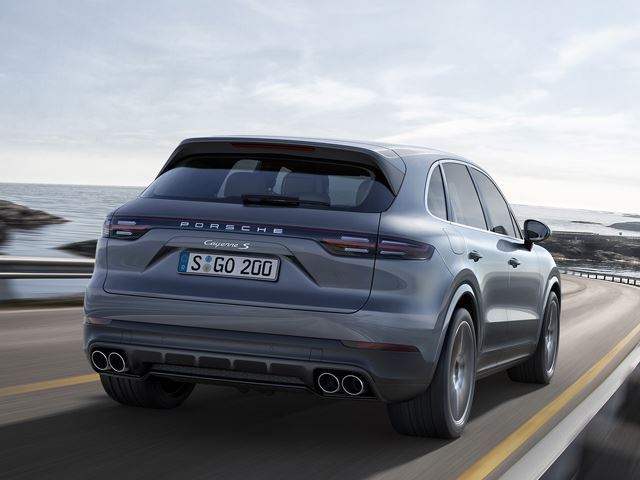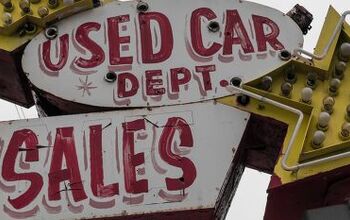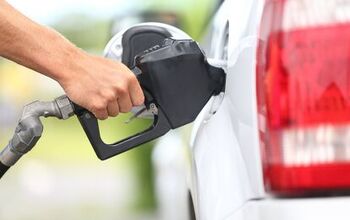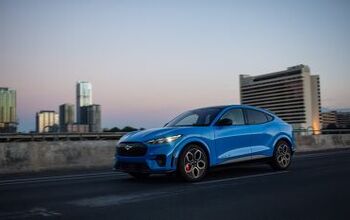Porsche Mulls Diesel Death for Entire Fleet, Starting With the Cayenne

This season’s must-have fashion for high-end automakers is the proposed elimination of diesel-powered engines. Volvo may keep theirs, but only if they’re supplemented by an electrified unit after 2019, and the same is true for both Jaguar and Land Rover. Mercedes-Benz hasn’t been quite so overt about its own diesel death, but it is pressing aggressively toward mild hybrids.
However, no manufacturer has the same incentive to distance itself from diesels as Volkswagen Group. Porsche, Audi, and VW all suffered from the company’s emissions scandal. Moving away from the fuel was to be expected, but Porsche’s chief executive hints diesel death may occur within a year as the company decides the future of the next-generation Cayenne.
When we previewed the new SUV last month, Porsche mentioned a pair of turbocharged gasoline engines but no diesel option. That was because the brand is still investigating whether diesel even has a place in the Cayenne and, by extension, the rest of its fleet.
“With Cayenne, we have sold a lot in Europe, and diesel is very important for customers,” Porsche CEO Oliver Blume said in an interview with Autocar. “There’s no decision yet, but we will do market analysis. The diesels are prepared for the market. What we decide, we will communicate [next] month.”
Blume specified that “diesel is not so important for Porsche.” He explained that diesel-powered vehicles make up about 15 percent of its total global sales volume and persist mainly in Europe, where individual countries are aggressively pushing for bans. The CEO noted Euro buyers may already be shying away from certain models as a result.
“We don’t know if this is a dip and will recover long term,” Blume said. “We closely watch the markets.”
The brand also doesn’t develop its own diesel engines. Instead, it sources them from VW Group — a move that caused problems when dieselgate expanded to the Audi-built 3.0-liter motor Porsche used in the current-generation Cayenne. In addition to recalls and a total abandonment of the platform, it also left the brand with 1,500 unsold models it had to repair and re-categorize as “lightly used.”
Porsche R&D boss Michael Steiner agrees that diesel is “something [Porsche is] investigating a lot,” as the European market looks especially uncertain. “What we’ve discussed and what we will investigate deeply this year and next; there could be a chance to start substituting diesel cars,” he said.
[Images: Porsche]

A staunch consumer advocate tracking industry trends and regulation. Before joining TTAC, Matt spent a decade working for marketing and research firms based in NYC. Clients included several of the world’s largest automakers, global tire brands, and aftermarket part suppliers. Dissatisfied with the corporate world and resentful of having to wear suits everyday, he pivoted to writing about cars. Since then, that man has become an ardent supporter of the right-to-repair movement, been interviewed on the auto industry by national radio broadcasts, driven more rental cars than anyone ever should, participated in amateur rallying events, and received the requisite minimum training as sanctioned by the SCCA. Handy with a wrench, Matt grew up surrounded by Detroit auto workers and managed to get a pizza delivery job before he was legally eligible. He later found himself driving box trucks through Manhattan, guaranteeing future sympathy for actual truckers. He continues to conduct research pertaining to the automotive sector as an independent contractor and has since moved back to his native Michigan, closer to where the cars are born. A contrarian, Matt claims to prefer understeer — stating that front and all-wheel drive vehicles cater best to his driving style.
More by Matt Posky
Latest Car Reviews
Read moreLatest Product Reviews
Read moreRecent Comments
- Plaincraig 1975 Mercury Cougar with the 460 four barrel. My dad bought it new and removed all the pollution control stuff and did a lot of upgrades to the engine (450hp). I got to use it from 1986 to 1991 when I got my Eclipse GSX. The payments and insurance for a 3000GT were going to be too much. No tickets no accidents so far in my many years and miles.My sister learned on a 76 LTD with the 350 two barrel then a Ford Escort but she has tickets (speeding but she has contacts so they get dismissed or fine and no points) and accidents (none her fault)
- Namesakeone If I were the parent of a teenage daughter, I would want her in an H1 Hummer. It would be big enough to protect her in a crash, too big for her to afford the fuel (and thus keep her home), big enough to intimidate her in a parallel-parking situation (and thus keep her home), and the transmission tunnel would prevent backseat sex.If I were the parent of a teenage son, I would want him to have, for his first wheeled transportation...a ride-on lawnmower. For obvious reasons.
- ToolGuy If I were a teen under the tutelage of one of the B&B, I think it would make perfect sense to jump straight into one of those "forever cars"... see then I could drive it forever and not have to worry about ever replacing it. This plan seems flawless, doesn't it?
- Rover Sig A short cab pickup truck, F150 or C/K-1500 or Ram, preferably a 6 cyl. These have no room for more than one or two passengers (USAA stats show biggest factor in teenage accidents is a vehicle full of kids) and no back seat (common sense tells you what back seats are used for). In a full-size pickup truck, the inevitable teenage accident is more survivable. Second choice would be an old full-size car, but these have all but disappeared from the used car lots. The "cute small car" is a death trap.
- W Conrad Sure every technology has some environmental impact, but those stuck in fossil fuel land are just not seeing the future of EV's makes sense. Rather than making EV's even better, these automakers are sticking with what they know. It will mean their end.




































Comments
Join the conversation
This article isn't about the Frankfurt show but Daimlers introductions of the EV crossover has to have been the douchiest introduction in automotive history.
Initial reaction? "Pedestrians, meet Porsche's new nicer dicer"